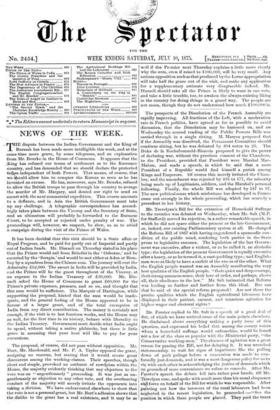Mr. Forster replied to Mr. Salt in a speech of
a good deal of fire, of which we have noticed some of the main points elsewhere. He disclaimed above everything making a party issue of this question, and expressed his belief that among the county voters whom a household suffrage would enfranchise, would be found not a few of the class so popular with the Ministerial party, "the Ccrnservative working-men." The absence of agitation was a great reason for passing the Bill, not for delaying it. It was wretched statesmanship to wait for signs of impatience like the pulling down of park palings before a concession was made' to con- fessedly just demands, and it was a most dangerous policy for us to vie with each other in acknowledging the justice of demands which on grounds of mere convenience we refuse to concede. After Mr. Arster's speech the debate fell into rather poor hands, till Mr. Trevelyan rose, and spoke with much more than his usual eloquence and force on behalf of the Bill for which he was responsible. After pointing out how the interests of the rural labourers had been neglected in the recent legislation, he proceeded :—" See the position in which these people are placed. They paid the taxes
they never voted ; they kept the laws which they have had no hand in making ; they did the country's work ; they bore the country's burdens; they fought the country's battles ; they were Englishmen in all respects and for every purpose, except during the progress of a General Election. Then, at the very moment when a citizen's privilege was best worth posaessing, they sank from the rank of citizens to the level of aliens. They saw men who had only a nominal and fictitious connection with their neighbourhood, flocking up by special trains from every quarter of the compass to vote in those booths from which they themselves were ruthlessly excluded, and then hurrying off in order to be in time to swamp by means of faggot and plural suffrages the real public opinion of some other unhappy locality. They, meanwhile —the native, the genuine, the resident inhabitants— stand in the market-place, waiting patiently and helplessly to hear who were to be their members during the next seven years."



































